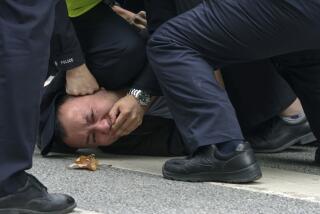Stability Concerns Spark China ‘Capital Flight’ : Investments: Billions of dollars are being moved into foreign accounts and real estate, experts say.
- Share via
HONG KONG — Chinese companies and individuals, worried about the stability of the last great communist regime, are moving billions of dollars out of China, say diplomats, bankers and real estate brokers.
They report that state-owned companies, collectives and the private firms permitted to operate in recent years are putting money into foreign bank accounts and property, including condominiums in the United States.
“It is capital flight, pure and simple,” said Hoe Ee Khor, an official of the International Monetary Fund in Beijing.
Khor says the movement of capital does not appear to have hurt China yet because its economy is strong and foreign-exchange reserves are estimated at close to $40 billion.
Corruption in the Chinese Communist Party is behind much of the flow, according to diplomats and executives of multinational banks.
Lack of investment opportunities in China is another contributing factor. Millions of Chinese have become rich in the past decade of rapid economic growth, but the government has dawdled on financial reforms necessary to encourage domestic investment.
“It makes sense that, if you don’t have proper investment opportunities in China, of course you’d want to put your money in a high-yield account abroad,” said Anthony Chan, an economist at Business International, a Hong Kong consulting firm.
Ways to move money have ranged from sneaking it out in suitcases across the border with Hong Kong to transfers through the now-defunct Bank of Credit & Commerce International’s branch in Shenzhen, southern China.
The most popular technique involves the refusal of Chinese companies based abroad to send their profits home. A report issued in May said 28% of export earnings--an estimated $14 billion a year--never make it to China.
Analysts said the presence of such large sums abroad, directly held by China’s specialized banks, indicated that central authorities in Beijing had lost much of their control.
Documents seized in raids on 23 Chinese-owned companies in the United States in September disclosed large transfers to bank accounts in Bermuda and the Cayman Islands, U.S. Customs officials said on condition of anonymity. The firms are being investigated on suspicion of avoiding up to $500 million in duties.
Bridge Properties Co. of Hong Kong estimates that it sells $1 million worth of U.S. real estate a month to Chinese nationals.
Betty Cheong, the general manager, said her firm often gets purchase orders by fax from China followed by transfers of cash from bank accounts in Hong Kong. She said 70% of her Chinese clients used “private funds.”
Tommy Tang, who owns the real estate company, said he did not know the source of the money.
“I want to ask them that question, but each time they pay me I forget,” he said with a smile.
Chinese officials realize corruption is a problem.
Communist Party General Secretary Jiang Zemin said on July 1, the party’s 70th anniversary: “Successors to the socialist cause should not act like overlords, abusing their power to make a fortune. If these decadent phenomena are allowed to continue, the party will be doomed to self-destruction.”
The flight of capital went from a trickle to a torrent after the crackdown on the pro-democracy movement in June, 1989, Chan said.
The State Administration for Exchange Control ordered Chinese firms abroad to repatriate all export earnings beginning Jan. 1 of this year. Western diplomats and businessmen say the order is being ignored.
China formed the Hong Kong Chinese Enterprise Assn., an umbrella organization of Chinese firms based in Hong Kong. Chinese officials said its purpose was to increase supervision of Chinese-owned businesses.
More to Read
Sign up for Essential California
The most important California stories and recommendations in your inbox every morning.
You may occasionally receive promotional content from the Los Angeles Times.













